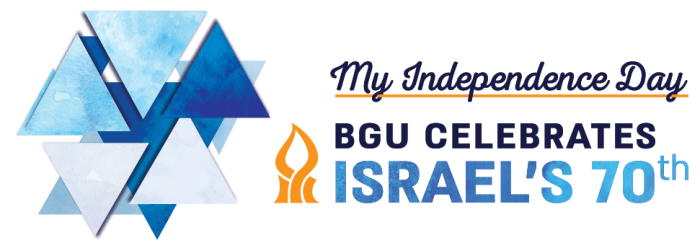
Prof. Ilana Nisky
Department of Biomedical Engineering

In research, every day is a little like Independence Day. In research and teaching at the University, I learn something new every day, and the very idea that I can raise a hypothesis, test it and discover something that was previously unknown provides a feeling of independence that is probably difficult to experience in other fields.
Nevertheless, I can think of some noteworthy highpoints:
The first research trip abroad: As soon as I completed my undergraduate degree, my advisor, the late Prof. Amir Karniel, sent me on a research visit to the Rehabilitation Institute of Chicago at the laboratory of Prof. Sandro Mussa-Ivaldi, one of the world's top researchers in our field. At that point, I hadn't thought about a career in research, but everything was new and exciting, and I caught the bug. Today Sandro is my research collaborator and I continue to learn a lot from him.
My first article: When I saw my name at the top of a scientific article and knew I was responsible for the work from start to finish, I felt a strange sensation, partially because at that time I still didn't like to write. Since then I have published many more articles and fallen in love with writing.
Leaving for postdoctoral training at Stanford: This was going out into the big wide world and a new research field. During my doctorate, I had dealt with brain research using robots, and when I set out on my post-doc, I was exposed for the first time to research in the field of robotic surgery and worked with surgeons. I arrived in another country, a new lab, and I had to prove myself. It was terrifying, challenging, but also a confidence builder.
A surprising discovery: One of the questions I am trying to answer in my research is how our brains deal with delayed information, similar to what you feel when working with a remote-controlled system – the operator moves a robot which controls another robot situated far away, and the robot returns information on the forces from the environment that affect it. My colleagues and I discovered that in this situation, we feel that the things that we touch are softer than they really are. This result and other observations led us to conclude that the brain is unable to represent a delay as the movement of forces on time. Three years ago, we discovered that the illusion of touch on softer things doesn't affect the motor action involved at the time of touching the object - we were surprised to find out that the brain is actually able to represent time in order to control actions. I hope that this understanding, that there is a gap between perception and implementation, will help us build the system most suited for robot-assisted surgery. This system will enable in the future the performance of complicated surgeries that require the surgeon to feel the patient's tissue even when thousands of miles away.
Independence of everyday thoughts: Going out for a long weekend run in the desert. You clean your head and think of the next (physical) step you make. This helps to gain independence from thoughts that you are stuck with during the week, and sometimes new thoughts of the next (mental) steps crawl into your head unexpectedly.
Read about other BGU faculty, alumni and honorees describing significant moments in their lives, linking them to the nation's history >>>>